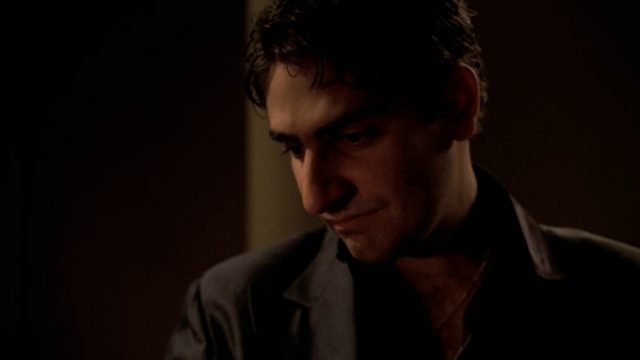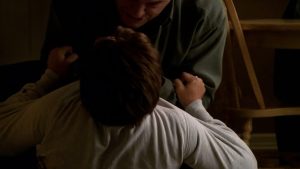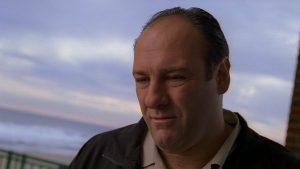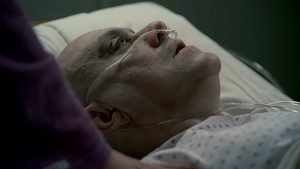SPOILERS AHEAD
#1. Season Four, Episode One, “For All Debts Public And Private”
“You’re being set up! He’s lying to you, whoever he is!”
“It wouldn’t make any difference.”
The Sopranos is not a show about psychology, and it took me a very long time to figure that out. Psychology in narrative is an exploration of a character’s worldview; the only worldview that matters in this show is David Chase’s, and for the most part what we’re seeing is people filtered through it. Christopher is the major exception to this, because he’s the only character who actively, willfully gives himself up to Tony. Everyone else goes along with Tony either because he’s done everything in his power to trap them in his sphere of influence, or because they’re even less self-aware and self-disciplined than he is. But Christopher says that line as if he’s been thinking this over already; you could convince me that this moment is the first time he’s actually said it out loud, and that this is a confession.
Before he’s a friend, before he’s a lover, before he’s a criminal or an ownage machine or a drug addict or a moral actor, Christopher is a Good Citizen. He doesn’t want to be the king, or the guy who puts things into motion; he’s happy just to be a cog in a machine, a small part of something bigger. I’ve seen people who seemed to have been built in a factory, parroting buzzwords they’d clearly picked up from someone else – the cheap and easy one is Pick Up Artists who think following a pre-prepared script will get them laid, although it’s something I’ve seen in people of all political stripes and philosophies. I think Christopher reflects a common part of the human condition in that what he really wants is to be a part of a community, and he’s willing to toe the party line to do it. You give him a stone tablet with ten commandments on it, he will follow those rules to the letter, and I think there are a lot of Christophers out there, and maybe they’re even what keeps the world spinning. wallflower once criticised another scene from the show as being something that didn’t necessarily have to happen at that moment, but this is definitely came at the exact right time, almost exactly halfway through the show’s run. This is an explanation for all of Christopher’s actions up until now, and this is the path he’ll follow all the way to the end.
Related: “That’s the guy, Adriana. My uncle Tony. That’s the guy I’m going to hell for.”
#2. Season Four, Episode Nine, “Whoever Did This”
“She was an innocent, beautiful creature! What did she ever do to you?”
If there’s anything I learned watching this show, it’s the limits of my personal moral outrage – this is a show that has a profound fury at everyone and everything, up to the very concept of drinking water from a water bottle, and I just don’t have it in me to be that angry all the time. Like a dartboard full of darts, at some point the show has to hit the mark; one of the things art can do is compress our worldviews down to a sentence, and I found this line really resonated with my personal sense of justice. It’s hard to get terribly offended when someone plays a game and loses, even when that game was rigged from the start; when Johnny Sack gets arrested at his daughter’s wedding, I don’t really feel for the guy beyond general empathy, because what did he expect would happen? An innocent is someone who never started playing in the first place, or who tried to opt out. It’s fun when gangsters own each other, when low-level players like Brandon are taken out, but people who never wanted to be a part of the game shouldn’t be pulled into it. This scene is the strongest argument to me that Tony isn’t just a creature of pure self-interest, but someone actively suppressing a conscience.
#3. Season Two, Episode Thirteen, “Funhouse”
“You know I’ve been working with the government, right Ton?”
“Don’t say it.”
“Come on, Ton. Sooner or later, you gotta face facts.”
“I don’t wanna hear it.”
“Well, you’re gonna hear it.”
“Fuck.”
“You passed me over for promotion, Ton. You knew.”
“How much shit you give ’em?”
“A lot.”
“Jesus, Puss. Fuck of a way for it all to end, huh?”
“Yeah.”
“Yeah.”
This is one of those situations where it wasn’t quite how I remembered it – what I remembered was dream!Pussy saying that first line and Tony simply saying “Yeah, I know,” and as you can see Tony’s dream has to work harder to get it out of him. But the basic idea I reacted to was there; this is the first major breach of the show’s otherwise rigid viewpoint. In his writeups, Todd VanDerWeff repeatedly said that the show did not say that change is impossible, only very difficult, but I think he understates how hard the show hit the beat of people refusing to change (it would be more accurate to say “change is possible, just not for these assholes”). But hitting that beat so often makes it feel more meaningful when it doesn’t, like a song that rigidly sticks to a few chords before opening up in the bridge, and I’m especially moved by how casually Tony accepts it. Sometimes a breakthrough or an insight is a big moment of yelling and tears and big action, but more often my moments have been like this, a simple statement of fact with massive repercussions.
I also take meaning from his insight coming from a dream. One of the ways my worldview and the worldview of The Sopranos coming together is a shared understanding of dreams as random farts of information that can also reveal underlying repressed emotions and thoughts, and interestingly dreams are the one consistent thing characters will act upon, even if it’s something as simple as Tony using a recurring dream as something to reconnect him with his estranged wife.
#4. Season Six, Episode Fourteen, “Stage 5”
“I see her.”
I don’t believe in God, and that was always a big impediment to me not just enjoying the show but even understanding it. I think the show takes the idea of a soul for granted, and it took a long time for me to even notice, let alone be able to word how I think the show defines it. When Paulie describes his idea of the afterlife, his self-serving attitude is played for laughs, but I think he got it pretty close to what the show believes – it’s like the picture of Dorian Gray. You’re born with a perfect soul, and every sin you commit degrades it. When you die, that’s it – there’s nothing you can do to either fix your soul or degrade it further. To The Sopranos, everyone’s at least a bit of a sinner, and so death is a very terrifying prospect, and this scene conveys that terror. Again, this isn’t a psychological show, it’s a show about the soul; before he dies, Johnny Sack loses everything – his body, his personality, his memory, even his sense of self – everything but his soul, and for one brief second he gets to see what’s on the other side before it comes.
Related: “I get it!”, where I got it.




